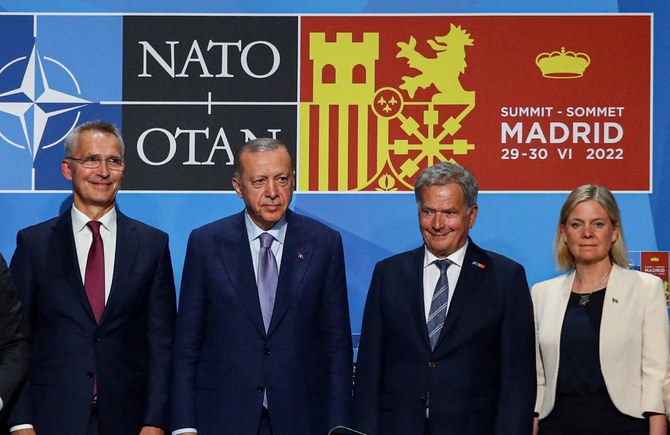ISTANBUL: Turkish President Recep Tayyip Erdogan has accepted a request from Sweden’s new prime minister to visit Turkey for talks aimed at overcoming Ankara’s objections to Stockholm and Helsinki’s bids to join NATO, local media reported on Friday.
Sweden and Finland earlier this year tore up their long-standing policies of non-alignment after Russia invaded Ukraine and launched their bids to join the US-led military alliance.
The move has received strong backing from the vast majority of NATO members but Erdogan has stalled the process over accusations the Nordic neighbors are havens for Kurdish militants hostile to Ankara.
“Sweden’s new prime minister requested an appointment. I told our friends to ‘give an appointment ... We will discuss these issues with him in our country,” Erdogan was quoted as saying by private NTV television on his plane back from Azerbaijan.
Swedish Prime Minister Ulf Kristersson said on Thursday he was ready to head to Ankara to urge Turkey to back his country’s bid to join the alliance.
During his first trip abroad as Sweden’s new foreign minister, Tobias Billstrom said in Helsinki that the proposed meeting between Erdogan and Kristersson was “very positive” news.
“We believe that close dialogue and close consultations with all the three parties ... is the way forward,” he said.
BACKGROUND
Turkish President Recep Tayyip Erdogan has accused Sweden and Finland of being havens for Kurdish militants, specifically highlighting the outlawed Kurdistan Workers’ Party, and for promoting ‘terrorism.’
Billstrom added that there would “be a broad scope for the negotiations about the implementation” of the deal and that Sweden was expecting Turkey to ratify the applications “in fullness of time.”
Kristersson said he aimed to show the Turkish leader that Sweden and Finland “actually do what we promised” to fulfill a deal with Ankara to clear their path into NATO.
Erdogan said Ankara’s position remained unchanged, calling on Sweden and Finland to deliver “these terrorists” sought by Turkish authorities.
“Unless they are sent back to us, things will not work at the parliamentary stage,” he threatened.
Erdogan has accused both countries of being havens for Kurdish militants, specifically highlighting the outlawed Kurdistan Workers’ Party, and for promoting “terrorism.”
According to a Western diplomat interviewed by AFP, there is a “reasonable chance” that an agreement will be reached with Ankara before the elections in Turkey scheduled for June.
Paul Levin, director of the Institute for Turkish Studies at Stockholm University, said he was “cautiously optimistic” about the possibility of a breakthrough.
“I think things could move. While the rhetoric so far has been pretty tough, especially from the Turkish side, it was also tough in advance o f the Madrid Summit,” Levin said, noting that the parties managed to reach an agreement allowing the formal invitation to move forward.
















